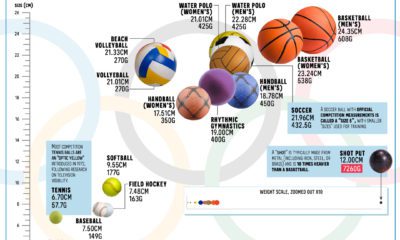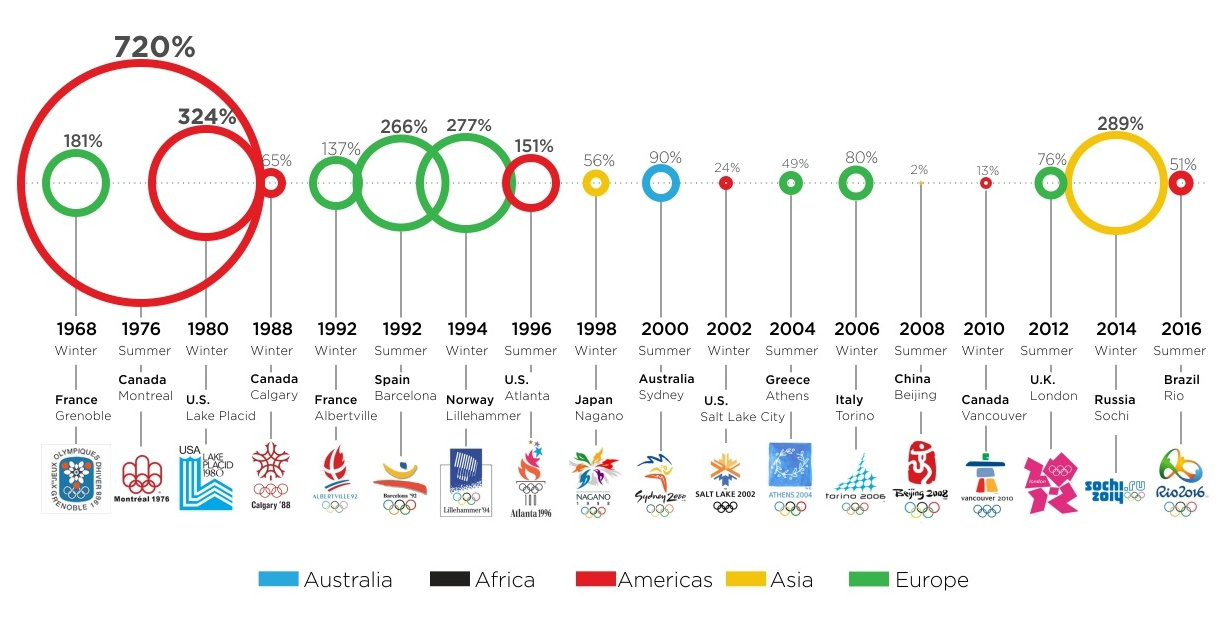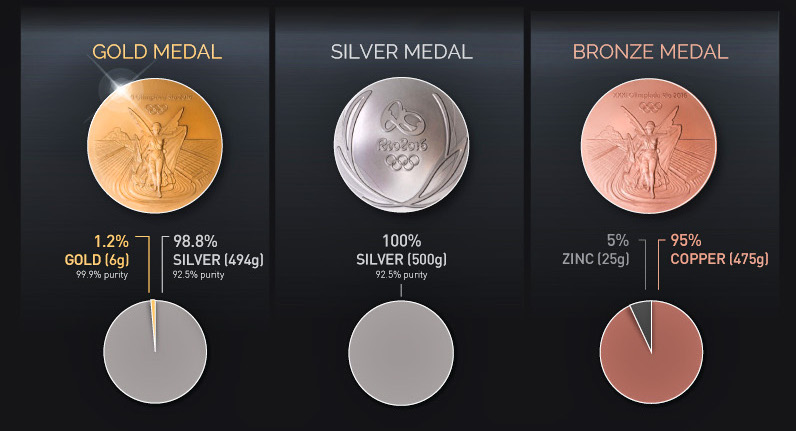Datastream
How Much Does it Cost to Host the Olympics?
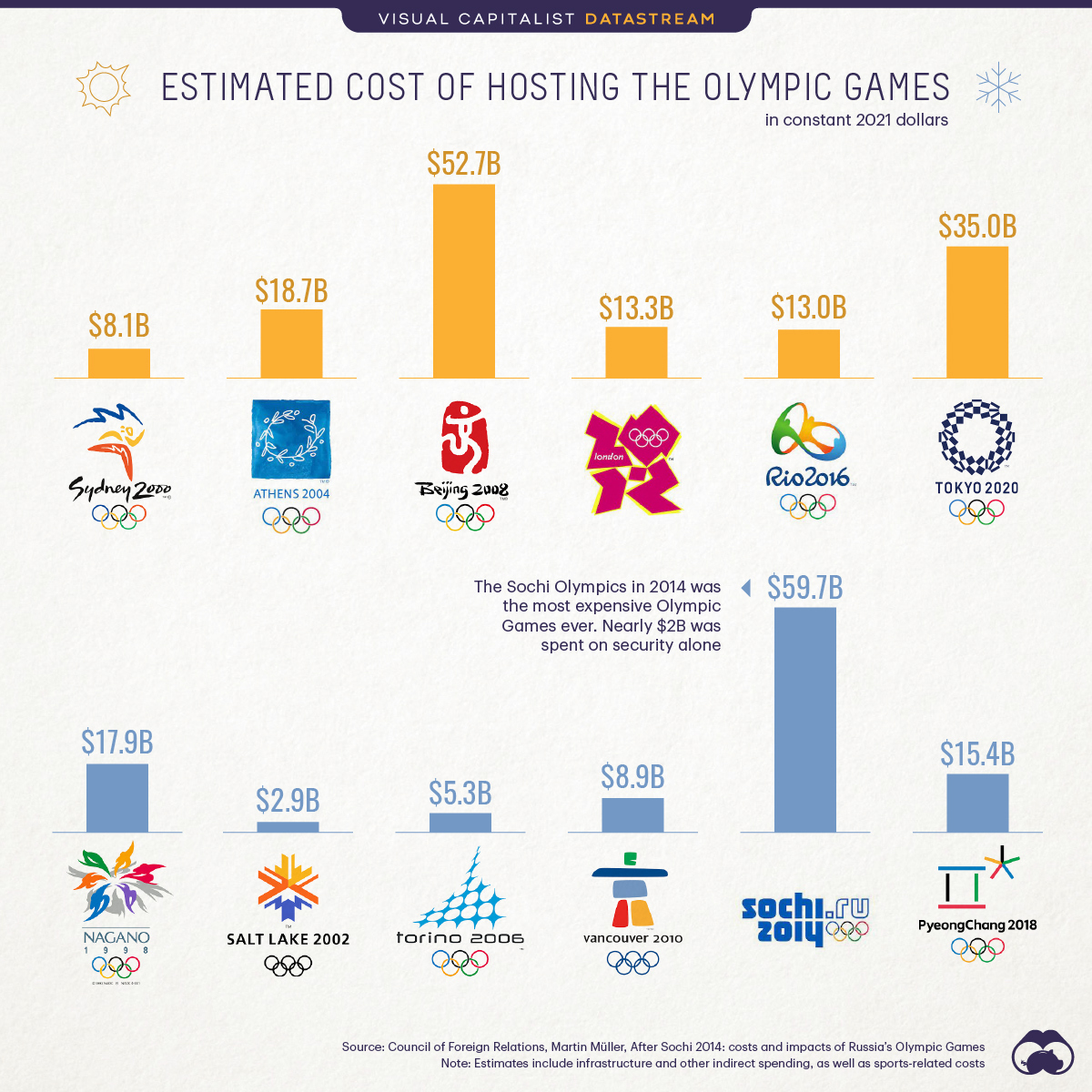
The Briefing
- The cost of hosting the Olympics varies drastically, depending on a host city’s infrastructure and existing sports facilities
- The Sochi games in 2014 were the most expensive, costing nearly $60 billion
- Cities take on these astronomical costs in the hopes that these new developments (railways, upgraded roads, airports, etc.) benefit the city long-term
How Much Does it Cost to Host the Olympics?
The scope of the Olympics has scaled up drastically.
Over a century ago, the first modern games had approximately 280 athletes competing from 12 different countries—these days, more than 10,000 athletes from 200+ countries participate in this prestigious athletic event.
As the games have increased in scope and size, so too has the cost of putting them on.
How much does it cost to host the Olympic games? Over the years, the final price tag has varied greatly from city to city. Here’s a look at the estimated cost of hosting the games (both summer and winter) since 1998.
Estimated Cost of Hosting the Olympics, by City
A major expense for a host city is building out infrastructure to support the tourism and traffic generated by the games.
For instance, when Sochi hosted the Winter Olympics in 2014, the city spent roughly $50.7 billion on non-sports-related infrastructure—approximately 85% of its total budget.
| Year | City | Type | Est. Cost (adjusted for inflation) |
|---|---|---|---|
| 1998 | Nagano 🇯🇵 | Winter | $17.9B |
| 2000 | Sydney 🇦🇺 | Summer | $8.1B |
| 2002 | Salt Lake City 🇺🇸 | Winter | $2.9B |
| 2004 | Athens 🇬🇷 | Summer | $18.7B |
| 2006 | Turin 🇮🇹 | Winter | $5.3B |
| 2008 | Bejing 🇨🇳 | Summer | $52.7B |
| 2010 | Vancouver 🇨🇦 | Winter | $8.9B |
| 2012 | London 🇬🇧 | Summer | $13.3B |
| 2014 | Sochi 🇷🇺 | Winter | $59.7B |
| 2016 | Rio de Janeiro 🇧🇷 | Summer | $13.0B |
| 2018 | Pyeongchang 🇰🇷 | Winter | $15.4B |
| 2020 | Tokyo 🇯🇵 | Summer | $35.0B |
Of course, the hope is that non-sports-related infrastructure will benefit the host city long-term, which is how countries rationalize the cost.
But sports-related facilities also cost a fortune to build, and are often not utilized once the games are over. For instance, Beijing’s national stadium cost $460 million to build initially, with millions needed to maintain it each year. The facility has barely been used in the years following the 2008 games.
That said, it is worth noting that Beijing plans on using the national stadium for the Opening and Closing ceremonies when they host the 2022 Winter Olympics.
Where does this data come from?
Source: Robert Baade and Victor Matheson, “Going for the Gold: The Economics of the Olympics”; Andrew Zimbalist, Circus Maximus; Marketplace; U.S. Bureau of Labor Statistics via Council on Foreign Relations
Details: Estimated costs have been adjusted to account for inflation. Estimates include infrastructure costs, as well as other indirect spending and sports-related expenses.
Datastream
Can You Calculate Your Daily Carbon Footprint?
Discover how the average person’s carbon footprint impacts the environment and learn how carbon credits can offset your carbon footprint.

The Briefing
- A person’s carbon footprint is substantial, with activities such as food consumption creating as much as 4,500 g of CO₂ emissions daily.
- By purchasing carbon credits from Carbon Streaming Corporation, you can offset your own emissions and fund positive climate action.
Your Everyday Carbon Footprint
While many large businesses and countries have committed to net-zero goals, it is essential to acknowledge that your everyday activities also contribute to global emissions.
In this graphic, sponsored by Carbon Streaming Corporation, we will explore how the choices we make and the products we use have a profound impact on our carbon footprint.
Carbon Emissions by Activity
Here are some of the daily activities and products of the average person and their carbon footprint, according to Clever Carbon.
| Household Activities & Products | CO2 Emissions (g) |
|---|---|
| 💡 Standard Light Bulb (100 watts, four hours) | 172 g |
| 📱 Mobile Phone Use (195 minutes per day)* | 189 g |
| 👕 Washing Machine (0.63 kWh) | 275 g |
| 🔥 Electric Oven (1.56 kWh) | 675 g |
| ♨️ Tumble Dryer (2.5 kWh) | 1,000 g |
| 🧻 Toilet Roll (2 ply) | 1,300 g |
| 🚿 Hot Shower (10 mins) | 2,000 g |
| 🚙 Daily Commute (one hour, by car) | 3,360 g |
| 🍽️ Average Daily Food Consumption (three meals of 600 calories) | 4,500 g |
| *Phone use based on yearly use of 69kg per the source, Reboxed | |
Your choice of transportation plays a crucial role in determining your carbon footprint. For instance, a 15 km daily commute to work on public transport generates an average of 1,464 g of CO₂ emissions. Compared to 3,360 g—twice the volume for a journey the same length by car.
By opting for more sustainable modes of transport, such as cycling, walking, or public transportation, you can significantly reduce your carbon footprint.
Addressing Your Carbon Footprint
One way to compensate for your emissions is by purchasing high-quality carbon credits.
Carbon credits are used to help fund projects that avoid, reduce or remove CO₂ emissions. This includes nature-based solutions such as reforestation and improved forest management, or technology-based solutions such as the production of biochar and carbon capture and storage (CCS).
While carbon credits offer a potential solution for individuals to help reduce global emissions, public awareness remains a significant challenge. A BCG-Patch survey revealed that only 34% of U.S. consumers are familiar with carbon credits, and only 3% have purchased them in the past.
About Carbon Streaming
By financing the creation or expansion of carbon projects, Carbon Streaming Corporation secures the rights to future carbon credits generated by these sustainable projects. You can then purchase these carbon credits to help fund climate solutions around the world and compensate for your own emissions.
Ready to get involved?
>> Learn more about purchasing carbon credits at Carbon Streaming
-

 Misc2 weeks ago
Misc2 weeks agoTesla Is Once Again the World’s Best-Selling EV Company
-

 AI1 week ago
AI1 week agoThe Stock Performance of U.S. Chipmakers So Far in 2024
-

 Misc1 week ago
Misc1 week agoAlmost Every EV Stock is Down After Q1 2024
-

 Money1 week ago
Money1 week agoWhere Does One U.S. Tax Dollar Go?
-

 Green2 weeks ago
Green2 weeks agoRanked: Top Countries by Total Forest Loss Since 2001
-
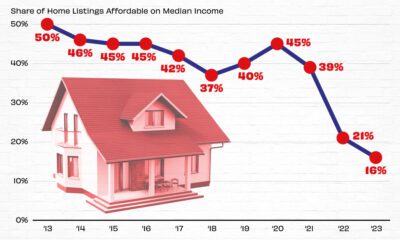
 Real Estate2 weeks ago
Real Estate2 weeks agoVisualizing America’s Shortage of Affordable Homes
-
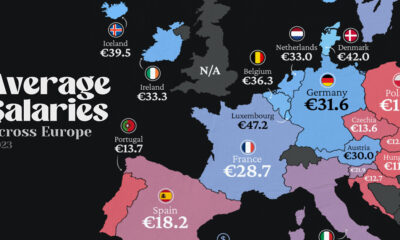
 Maps2 weeks ago
Maps2 weeks agoMapped: Average Wages Across Europe
-

 Mining2 weeks ago
Mining2 weeks agoCharted: The Value Gap Between the Gold Price and Gold Miners



